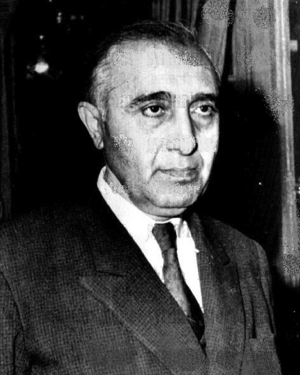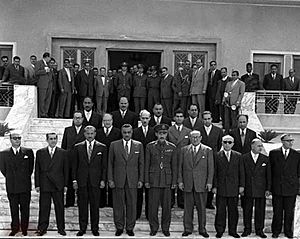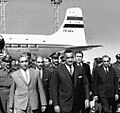Salah al-Din al-Bitar facts for kids
Quick facts for kids
Salah al-Din al-Bitar
صلاح الدين البيطار |
|
|---|---|
 |
|
| 47th & 50th Prime Minister of Syria | |
| In office 1 January 1966 – 23 February 1966 |
|
| President | Amin al-Hafiz |
| Preceded by | Yusuf Zuayyin |
| Succeeded by | Yusuf Zuayyin |
| In office 13 May 1964 – 3 October 1964 |
|
| President | Amin al-Hafiz |
| Preceded by | Amin al-Hafiz |
| Succeeded by | Amin al-Hafiz |
| In office 9 March 1963 – 11 November 1963 |
|
| President | Lu'ay al-Atassi Amin al-Hafiz |
| Preceded by | Khalid al-Azm |
| Succeeded by | Amin al-Hafiz |
| Member of the National Command of the Arab Socialist Ba'ath Party | |
| In office 6 April 1947 – 1 September 1959 |
|
| Minister of Foreign Affairs | |
| In office June 1956 – 22 February 1958 |
|
| President | Shukri al-Quwatli |
| Preceded by | Said al-Ghazzi |
| Succeeded by | Mahmoud Fawzi (UAR) |
| Personal details | |
| Born | 1 January 1912 Damascus, Ottoman Syria, Ottoman Empire |
| Died | 21 July 1980 (aged 68) Paris, France |
| Political party | Syrian Regional Branch of the Arab Socialist Ba'ath Party |
Salah al-Din al-Bitar (Arabic: صلاح الدين البيطار, romanized: Ṣalāḥ ad-Dīn al-Bīṭār; 1 January 1912 – 21 July 1980) was an important Syrian politician. He helped start the Arab Baʿth Party with Michel Aflaq in the early 1940s. While studying in Paris in the 1930s, they developed ideas that mixed nationalism (love for one's country) with socialism (ideas about fair sharing of wealth). Bitar later served as prime minister several times in Syria. He became less involved with the party as its ideas changed. In 1966, he left Syria and lived mostly in Europe. He continued to be active in politics until he passed away in Paris in 1980.
Contents
Early Life and Education
Salah al-Din al-Bitar was born in 1912 in Damascus, a city in Syria. His family was well-off, and his father was a grain merchant. Many of his family members were religious scholars. Bitar grew up in a traditional family and went to a Muslim elementary school. He then attended Maktab Anbar for his secondary education. During his youth, he saw many political changes. His home area, Midan, played a big part in the Great Syrian Revolution of 1925 against France, which was then in charge of Syria.
In 1929, Bitar went to France to study at the Sorbonne. There, he met Michel Aflaq, who was also from Damascus. They were both interested in the political ideas of their time. They began to think about how nationalist and Marxist ideas could help their home country. Bitar returned to Syria in 1934. He became a teacher of physics and mathematics at the Tajhiz al-Ula school, where Aflaq was already teaching.
Starting the Ba'ath Party
Early Political Steps
For the next two years, Bitar, Aflaq, and their friends worked on a magazine called al-Tali`a, which means "the vanguard." This magazine focused more on social issues than on national problems. At first, Bitar and Aflaq's political views were similar to the Syrian Communist Party. However, they became disappointed with the Communists in 1936. This happened when the Popular Front government came to power in France. Even though the French Communist Party was part of the government, France's approach to its colonies, like Syria, did not change much. Bitar and Aflaq were not happy with the Syrian Communist Party's stance.
In 1939, Aflaq and Bitar started to gain a small group of student followers. In 1941, they handed out flyers against French rule. They used the name al-ihyaa' al-'arabi, meaning "the Arab Resurrection." Later, they started using the name al-ba'ath al-'arabi, which means the same thing. This name had already been used by Zaki al-Arsuzi, another nationalist from Syria.
On October 24, 1942, both Bitar and Aflaq quit their teaching jobs to work in politics full-time. They slowly gained more supporters. In 1945, the first elected group of the Arab Ba'ath Movement was formed, including both of them. The next year, many new members joined when Wahib al-Ghanim and most of Arsuzi's former supporters joined the movement.
Leading the Ba'ath Party
In 1947, at the first party meeting in Damascus, Bitar was chosen as the secretary general. Aflaq became the "doyen," which made him the main leader of the party. In 1952, Syria's military leader, Adib al-Shishakli, banned all political parties. Bitar and Aflaq went to neighboring Lebanon for safety. There, they met Akram al-Hawrani, an experienced politician. Hawrani had recently started the Arab Socialist Party and had many followers, especially among farmers and military officers.
The three politicians decided to combine their parties. They worked together to overthrow Shishakli in 1954. After this, a meeting confirmed the merger of the two parties into the Arab Socialist Ba'ath Party. Bitar and Aflaq's original party rules were kept. All three leaders were elected to the party's new National Command.
Politics and Power: 1954–1958
After Shishakli was overthrown, Syria held its first democratic elections in five years. Bitar was elected as a representative for Damascus. He defeated the leader of the Syrian Social National Party, which was a strong opponent of the Ba'ath. Bitar became the Minister for Foreign Affairs in 1956 and held this job until 1958. Like other Ba'ath Party members, he supported the idea of Syria joining with Nasser's Egypt.
United Arab Republic: 1958–1963
Bitar had hoped to become the Vice President of the United Arab Republic (UAR), which was the union of Egypt and Syria. Instead, he was made the Minister of State for Arab Affairs, and later the Minister of Culture. At first, Bitar was the only Syrian in the main government. He and other Syrians in the UAR leadership became worried because Nasser gave Egyptians most of the power in running the UAR. Nasser did not want a joint leadership council of Egyptians and Syrians.
In December 1959, Bitar and other Syrian ministers resigned from their positions. They were unhappy with how the UAR was being run. More Syrians started to resign. By August 1960, only a few Syrians were left in the UAR's decision-making bodies. From December 1959, Bitar and the Ba'ath Party began to oppose the UAR's political structure. Bitar supported the coup on September 28, 1961, which ended the UAR's union between Egypt and Syria.
After the UAR broke up, Bitar and other politicians signed a document on October 2, 1961. This document said that Nasser had changed the idea of Arab nationalism and accused him of stopping democracy in Syria. Bitar later took back his signature from this document because he faced public criticism. Some party members even wanted Aflaq to remove Bitar from the party. After the UAR dissolved, Bitar did not rejoin the Ba'ath Party in Syria until after the March 8, 1963 Syrian coup. Because of this, Aflaq became the clear leader of the Ba'ath Party.
Time as Prime Minister
First Term: 1963
First Government: March–May 1963
Bitar's first government was formed on March 9, 1963, after the 1963 Syrian coup. Nine of the twenty government members were from the Ba'ath Party. Most important ministries, except defense, were given to Ba'athists. This government, which included both Ba'athists and Nasser supporters, was not very stable. Bitar and Aflaq wanted to gain support from the Syrian people and hoped to get Nasser's approval, as he was still popular. However, many Ba'ath members wanted the party to focus only on Syria.
Bitar also served as the foreign affairs minister. He represented Syria in talks with Egypt and Iraq about forming a union in March and April 1963. During these talks, Nasser treated the Syrian delegates poorly. This made Bitar and Aflaq lean more towards the idea of focusing on Syria. Nasser said he would only continue talks if the Ba'ath Party gave more power to Nasser's supporters in Syria, which the Ba'athists refused. This led to resignations from Nasser's supporters in Bitar's government.
Between April 28 and May 2, the Ba'ath Party removed several pro-Egyptian officers from the military. After the talks with Nasser ended, the Syrian government tried to make it seem like they were still happening. On May 2, Bitar's government announced that all Syrian banks would become state-owned. This was likely a move to impress Nasser, who had said that nationalizing banks was a first step for revolutionary change.
The removal of pro-Egyptian officers led the Nasser supporters in the government to resign again on May 6. They said they would return if all their demands were met. Soon after, a violent protest happened in Damascus, which was stopped by Amin al-Hafiz, the interior minister. The short-lived Ba'athist-Nasser supporter government ended on May 11. On May 13, Bitar formed his second government.
Second Government: May–August 1963
Bitar's second government mainly consisted of Ba'athists and independent members. Six positions were left empty in case Nasser's supporters decided to rejoin. Hafiz became deputy prime minister and stayed as interior minister. The formation of this government changed relations between Egypt and Syria. The Egyptian government said Bitar's new government was a "blow to the Union."
A power struggle happened between Ziad al-Hariri, the chief of staff, and the Military Committee from June 23 to July 8, 1963. The Military Committee was worried about Hariri's independent power. Bitar supported Hariri, believing he could help control the Military Committee's growing influence. On June 23, while Hariri was away, the Military Committee moved his supporters from important military jobs. Hariri was also demoted. Hariri returned to Damascus to gather his supporters. However, when it became clear the committee had more support in the army, Hariri accepted defeat and left the country. Bitar was sad to see him go, believing that without Hariri, the Military Committee would have full control over the military.
On July 18, a Nasser supporter officer named Jassem Alwan tried to overthrow the Ba'athists. The coup failed, and the Ba'athists stopped it violently. Twenty people suspected of being involved were immediately executed. President Lu'ay al-Atassi was removed from his post on July 27 and replaced by Hafiz. Alwan's attempted coup and Atassi's removal affected relations between Egypt and Syria. On July 22, Nasser announced that Egypt had pulled out of the Federal Union Agreement, blaming the Ba'athists. He criticized the Ba'ath Party, which was effective because many Syrian Muslims disliked the party's open support for secularism and the fact that some officials were Christians. After order was restored, Bitar dissolved his government and formed a new one on August 4.
Third Government: August–November 1963
Unlike his second government, Bitar's third government had no empty positions for Nasser's supporters. It was made up of Ba'athists and independent members who supported unity. Hafiz left the government and was replaced by Nureddin al-Atassi as interior minister. This was the first time the Ba'athists fully controlled the government.
However, things were not going as Bitar and Aflaq had planned. The party was divided into many groups with different ideas. Most of them wanted to remove Aflaq as the party's Secretary General. Aflaq and Bitar gave the job of organizing the party to Hammud al-Shufi. Shufi, who was thought to support Aflaq, was actually a radical Marxist. Shufi's group, which controlled the Syrian branch of the party, became allies with the Military Committee.
At party meetings in September and October 1963, Aflaq's and Bitar's influence clearly decreased. Bitar was not elected to the Syrian party leadership. All eight seats went to Shufi's supporters. Bitar and Aflaq also failed to be elected at the main party meeting. The congress approved new ideas that changed the party's focus from Arab unity to a type of socialism. Bitar, who had reportedly resigned after the September meeting, was forced to delay his resignation until after the October meeting. Bitar's third government was dissolved on November 11, and Hafiz took over as prime minister on November 12.
Second Term: 1964
Bitar was made prime minister again after the 1964 Hama riot. However, the power balance between the old Ba'ath leaders and the Military Committee remained the same. Hafiz resigned as prime minister because the Military Committee wanted its members to be less visible for a while. Bitar's government did not include any strong Military Committee supporters. Most of the government members were old Ba'ath leaders.
On April 24, a temporary constitution for Syria was introduced. It said that the main executive power would go to the new Presidential Council. The Presidential Council included Hafiz as chairman, Umram as Deputy Chairman, Bitar, Nureddin al-Atassi, and Mansur al-Atrash. This showed the power balance between the three main groups. Hafiz, Umran, and Nureddin al-Atassi supported the Military Committee, while Bitar and Atrash were old Ba'ath leaders. Bitar was the only member of the Presidential Council who was not part of the main party leadership.
Bitar's government tried to regain the people's trust in the Ba'ath Party. Bitar said his government would "provide freedom, security, confidence, equal opportunities, and to safeguard individual personal freedoms and respect for public freedoms." On May 27, the Presidential Council supported Bitar's policies. Bitar's government released 180 political prisoners in June. It is believed that Hafiz made the decision to release them.
Bitar resigned from his position on October 3. Shortly after, Bitar and Atrash lost their seats on the Presidential Council. They were replaced by Salah Jadid and Hafiz, who both supported the Military Committee. The main party leadership was unhappy with the military's control of the state. They convinced Aflaq, who had left Syria, to return.
Third Term: 1966
The old leaders were weakened, and the new government led by Hafiz introduced several state-controlled measures. The Military Committee made the main party leadership less important. At a party meeting in April 1965, Aflaq did not run for Secretary General but was re-elected to the main leadership against his wishes. Munif al-Razzaz became the new secretary general. To rebuild the authority of the main leadership, Razzaz had to deal with two groups: the Military Committee supporters who controlled the party in Syria, and the old leaders like Aflaq and Bitar. Both Aflaq and Bitar wanted to directly challenge the Military Committee.
Meanwhile, a power struggle began within the Military Committee between Hafiz and Jadid. The main party leadership helped them reach a compromise. This led to a new government led by Yusuf Zuayyin. Razzaz decided to expand the membership of the Syrian party leadership. Aflaq and Bitar asked for nine of the sixteen members to be "pan-Arab" (meaning they supported Arab unity), including Bitar. The Military Committee responded by not appointing any old leaders to the Syrian party leadership. Hafiz was re-elected as the Syrian leader, and Jadid was elected as his assistant.
By this time, Bitar had started talks with Umran. They agreed that Umran and Hafiz would protect the party from the Military Committee. Bitar told the main party leadership about these talks. To their dismay, the Syrian party leadership in October and November strengthened Jadid's position in the armed forces. They appointed several Alawites and Druze to senior positions and new governors in cities like Damascus and Aleppo. As Jadid and the Military Committee gained more power, Aflaq, Bitar, Hafiz, and others began to support dissolving the Syrian party leadership.
These discussions lasted from December 8 to December 20, 1965. Some argued that dissolving the Syrian leadership would not help the main leadership. Before they could agree, forces loyal to Jadid took control of an army unit in Homs on December 20. Because of this abuse of power, on December 22, the main party leadership dissolved the Syrian party leadership. They appointed a Supreme Command, which included all the main leadership members, five other old leaders (including Bitar), and five spots for the regionalists, who did not accept the offer. In response, Zu'ayyin's government and all the regionalist members of the Presidential Council resigned.
Later Life and Passing
Many party members from other groups fled. Bitar and other historical leaders of the party were captured and held in a government guest house. When the new government started a purge in August of that year, Bitar escaped and fled to Beirut.
In 1978, Bitar received a pardon from President Hafiz al-Assad, who came to power in 1970. Bitar briefly returned to Damascus. However, he did not agree with Assad's views. Soon after a meeting with Assad ended without an agreement, Bitar started criticizing the Syrian government from his exile in Paris. He did this in a new magazine he called al-Ihiyyaa al-Arabi, which was the same name he and Aflaq had used almost forty years earlier. There were also rumors that he was in contact with Syrian opposition figures in Baghdad.
On July 21, 1980, Bitar was shot and passed away in Paris. The person who shot him was never officially found.
Books by Salah al-Din al-Bitar
His writings include:
- Al-Siyasah al-Arabiyah bayn al-Mabda wa al-Tatbiq (Arab Policy in Principle and Practice). Beirut: Dar al-Taliah, 1960.
- Nida al-Ba'th (The Baath's Struggle). Beirut: Dar al-Taliah, 1963–1965. Volumes 1-4 contain items by subject.
Images for kids
See also
 In Spanish: Salah Bitar para niños
In Spanish: Salah Bitar para niños
 | Dorothy Vaughan |
 | Charles Henry Turner |
 | Hildrus Poindexter |
 | Henry Cecil McBay |





